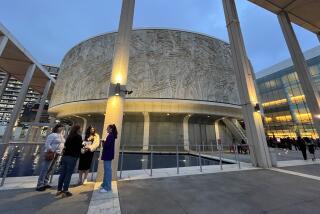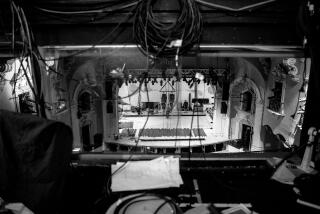China: Clash of Culture, Control in Shanghai : Arts, Politics Still Mix in Shanghai
- Share via
SHANGHAI — At Shanghai’s new opera house, where the acoustics are as crystalline as the vaulting glass walls, the symbolism of the Grand Theater’s opening also rings loud and clear. The $150-million glass culture palace designed by French architect Jean-Marie Charpentier to host international performers such as tenor Jose Carreras and operas such as “Aida” and “Faust,” is meant to be a declaration about the state of the arts in Shanghai.
But the performances that do not happen here say more about the art of the state in its efforts to open the door to cultural exchange while trying to control what goes through.
Just as the Chinese economy lurches from central planning toward a market system, management of the arts is a jerky pas de deux of art and politics, culture and control, two steps forward, one step back.
Nowhere is this more apparent--and surprising--than in Shanghai, one of China’s most dynamic and open cities, which has spent millions on spectacular museums, performance halls and stadiums in a bid for a place on the world’s cultural map. This seems the place to push the artistic edge. Instead, Shanghai has built a reputation as being even more conservative than Beijing when it comes to the arts.
“The exchange of art is more complicated than trading a commodity,” said Bei Zhaojian, a deputy director of Shanghai’s Culture Bureau. “Art is related to politics. Where culture is concerned, a nation’s feelings and the government’s policies are also concerned.”
That means that talent and Chinese heritage aside, Yo-Yo Ma, the cellist, is not allowed to play here because he contributed to the soundtrack of “Seven Years in Tibet,” a 1997 film about the Dalai Lama that Beijing said portrayed China “incorrectly.”
And nearby, at the Shanghai Center Theater, where Grammy Award winners and international orchestras performed last year, the stage is now silent save for appearances by the Shanghai Acrobat Troupe. The American-owned and -operated theater had to cancel its season midway through, after the government declared that only Chinese promoters could bring in foreign acts. The policy, many insiders in the arts community insist, was enforced after the then-minister of culture felt slighted during a visit to the White House. The government denies the two events are related.
The Face China Presents to the World
The country’s culture czars not only regulate what Chinese audiences are able to see--only 10 foreign films can be shown in China a year--they are just as concerned about the face China shows to the world. The Shanghai Culture Bureau blocked its top traditional opera troupe from performing the classic “Peony Pavilion” at New York’s Lincoln Center in June, deeming the modern interpretation “pornographic, superstitious and feudal”--not the pure, model version they wanted to present abroad.
While other conflicts have occurred behind the scenes, the acrimonious, last-minute negotiations in Shanghai over “Peony Pavilion” dragged on in the international spotlight. Six tons of sets and costumes were set to be shipped to New York, where tickets already had been sold, when the Culture Bureau suddenly demanded sweeping revisions.
Ma Bomin, Shanghai’s top cultural official and a former opera star herself, objected to additions made by the production’s Chinese-American director, Chen Shizheng: unconventional staging, a love scene considered “pornographic’ though it was discreetly silhouetted behind a screen, “superstitious” elements such as actors burning “hell money” at a funeral, and showing “dirty” things such as chamber pots on stage. The clash climaxed during President Clinton’s visit to Shanghai in June, and even a nudge from both the president and Secretary of State Madeleine Albright could not budge Shanghai’s culture controllers.
“We considered ‘Peony Pavilion’ more than a commercial event or a cultural event,” said Bei. “It is a masterpiece of Chinese opera, and the composer is regarded as China’s Shakespeare. When we present Chinese traditional culture overseas, we want to show the fine things, not exaggerate the bad things. It was a matter of preserving China’s culture or ruining it.”
Ma refused requests for an interview.
Some Evidence of Change
Though the “Peony Pavilion” episode seemed to be a step back from international exchange--the opera troupe also missed performances in Paris, Hong Kong and Sydney--the Culture Bureau says there has been no change in policy. As evidence, Bei points to an experimental theater festival that Shanghai hosted last month. In a contrast to the subtle love scene in “Peony Pavilion,” Japanese actresses French-kissed--without a screen. On another stage, Norwegian actors dramatized a mental breakdown as a metaphor for the erosion of the old guard.
Those in arts circles are quick to point out China’s Culture Ministry in Beijing approved the festival, not Shanghai’s Culture Bureau. But Shanghai officials claimed it as a success. “This can be taken as a sign that Shanghai’s door is still open,” said Bei.
While the causes of the “Peony Pavilion” debacle are still being debated, the effect on perceptions of Shanghai’s commitment to cultural exchange are clear. Director Chen Shizheng said he’ll never come back to work in China. U.S. organizations that helped sponsor the program say they have become more cautious in planning high-profile and costly exchanges. Corporate sponsors, who play an integral role in covering the expense of bringing world-class groups to China, are having second thoughts before investing in the arts.
Last month’s vaunted Shanghai Experimental Theater Festival, for example, almost didn’t happen. Several large multinational companies yanked about $30,000 worth of backing two weeks before it opened, spooked by the “Peony Pavilion’ incident and the sudden cancellation of a scheduled performance of American Ballet Theater at the Grand Theater, even though it was due to financial, not political reasons.
While many foreign companies find arts sponsorship a neutral way to show their commitment to a city, there is an unavoidable political side. “When the government asks us to back a project, frankly, we can’t say no,” said the spokesman of a large U.S. company in Shanghai. Others have turned instead to more politically correct causes such as flood relief, education or business symposiums.
“We tend to sponsor conferences more than the arts in China,” said Brian Bouttell, the managing partner of U.S. accounting firm KPMG Peat Marwick in Shanghai. Bouttell served on the board of a theater in Leeds, Britain, and quietly supports artistic endeavors from his own pocket. But his corporation doesn’t, partly because of restrictions on the way foreign professionals can advertise, but also because of the expense and uncertainty. “To have something pulled at the last minute is the ultimate frustration,” he said.
The government is anxious to leave behind the time when art was purely political: From 1966 to 1976, Shanghai was the cradle of Cultural Revolution era agitprop theater, where a young actress Jiang Qing left the stage to take the dais as Madame Mao.
Even today, in an exercise in nationalism, government troupes perform paeans to the brave soldiers who saved the country from floods last summer, and workers receive tickets from their companies to see traditional performances, a holdover from the time when theater was a teaching tool.
But now there’s a move toward a more commercial arts market, as the government decreases funding for groups who can find audiences on their own. “When the Grand Theater opened, many people expected to receive free tickets,” said Bei. “They were disappointed. And 95% of the tickets sold, even at high prices.”
But he said sometimes the bureau denies performance permits to companies whose profit projections seem overly ambitious. “The whole country is in transition from a planned economy to a market system,” he said. “Our performing arts are also in this state. It will be some time before this city can support a million-dollar show through ticket sales alone.”
Most promoters agree. Fan Yisong, the deputy director of the Shanghai Center Theater, said after canceling its season, the company decided to wait for the market to mature and rules to soften before finding a local partner to help it produce international shows. “If you want to be successful, you have to respond to what people like,” he said, “not what some officials like.”
But a few, such as the Chinese-American joint venture A&C; Promotion Ltd., have found success through a mixture of consulting, newsletters and production. This year, it will bring to China jazz musician Wynton Marsalis, pop group Boyz II Men and Washington’s National Symphony Orchestra.
With its opulent new performing halls, “Shanghai has the skeleton,” said A&C; executive director William Brent. “It’s still working on the soul.”
More to Read
The biggest entertainment stories
Get our big stories about Hollywood, film, television, music, arts, culture and more right in your inbox as soon as they publish.
You may occasionally receive promotional content from the Los Angeles Times.










